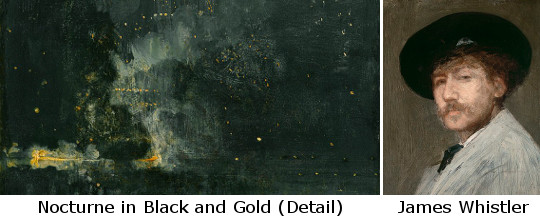James McNeill Whistler? Pablo Picasso? John Ruskin? Apocryphal?

Question for Quote Investigator: According to legend a famous painter once created a work of art in a very rapid and seemingly slipshod fashion. Yet the price assigned to the piece was exorbitant. The artist was asked why the price of the painting was so large when the time expended in its construction was so small. The reply was something like:
I am not asking this high price for a brief amount of work. I ask it for the knowledge gained during the efforts of a lifetime.
I have heard versions of this anecdote referring to James McNeill Whistler and Pablo Picasso. Would you please examine this topic?
Reply from Quote Investigator: In 1877 James McNeill Whistler exhibited several paintings including “Nocturne in Black and Gold” at the Grosvenor Gallery in London which was operated by Sir Coutts Lindsay and his wife. The famous art critic John Ruskin’s evaluation was extraordinarily harsh; the prices were absurdly high, and the technique was crude he maintained. Emphasis added to excerpts by QI:1
For Mr. Whistler’s own sake, no less than for the protection of the purchaser, Sir Coutts Lindsay ought not to have admitted works into the gallery in which the ill-educated conceit of the artist so nearly approached the aspect of wilful imposture. I have seen and heard much of cockney impudence before now, but never expected to hear a coxcomb ask two hundred guineas for flinging a pot of paint in the public’s face.
Whistler believed that Ruskin’s remarks were libelous, and he initiated a court case against the critic. In 1878 “The Times” of London wrote about the trial and described Whistler’s testimony. The painter admitted that “Nocturne in Black and Gold” was completed quickly, but he believed it was still quite valuable:2
Of course, he expected that his pictures would be criticized. The “Nocturne in Black and Gold” he knocked off in a couple of days. He painted the picture one day and finished it off the next. He did not give his pictures time to mellow, but he exposed them in the open air, as he went on with his work, to dry. He did not ask 200 guineas for two days’ work; he asked it for the knowledge he had gained in the work of a lifetime.
Whistler prevailed at trial, but the jury awarded him only the nominal sum of one farthing. In addition, the judge did not allow Whistler to recover the costs he incurred while arguing the lawsuit.
Whistler published a transcript of his remarks during the trial within his 1890 book “The Gentle Art of Making Enemies”. See further below to read that text.
A thematically similar anecdote about Pablo Picasso is also circulating, and information about that topic is available here. Another pertinent tale called “Knowing where to tap” is examined here.
Below are additional selected citations in chronological order.
Continue reading “Dialogue Origin: “The Labour of Two Days, Is That for Which You Ask Two Hundred Guineas!” “No; I Ask It for the Knowledge of a Lifetime.””
